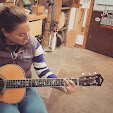 |
| View from the top of Quillen Ridge. |
My dad talks a lot about E.C. Ball. He was a musician who played guitar in a band called the Rugby Gully Jumpers with my grandfather, sang gospel songs with his wife Orna, drove the school bus, and lived up the holler on Quillen Ridge in Rugby, VA. I never gave him significant thought until I really started to listen to the stories my dad tells.
 |
| EC Ball's home today. |
I asked what E.C.'s job was, curious if he was just a musician or if he did something else for income as well. My dad told me that he was the bus driver for his high school. My dad never took the bus so he didn't have anything much to add about that aspect of the job, but he said the bus drivers would drive in the mornings then stay near the school all day, walking down the hill to the store to loaf a while, then walking back up the hill to play horse shoes at the school, then driving the kids back home in the afternoon. My dad told me, "I was really good at horseshoes, they would let me play with them sometimes, but I would whoop them." He said the old men took their game of horseshoes very seriously and would never let kids play with them so the fact that my dad was invited to play was a big deal.
Like my dad and I, E.C. also enjoyed working with his hands. The agriculture teacher at the high school was also assigned to be the shop teacher, but he never stepped foot in the shop and never taught the kids anything therefore the shop was left empty most of the time. Of course the exception being for the occasional curious student, one of whom shoved a broom handle into the jointer to see what would happen and now lives without a pointer finger. The local men would dabble in woodworking in the unoccupied shop, and E.C. would be a regular visitor, making small furniture, gun racks (one of which he made for my dad), and little accents to hang on his home. I knew which house was his because of the two diamond shaped decorations adorning each side of the door of his now dilapidated house. While the current state of the house brought some sadness, I felt special that I knew E.C. made those in my dad's high school wood shop.
 |
| EC, his fingerboard and my dad's first inlay job. |
Since I enjoy inlay work, I like to think of E.C. as a bit of kindred spirit in that respect. He had a preacher friend who saved and saved and eventually was able to buy himself a brand new D-28. He asked E.C. to custom inlay the fingerboard to match the '49 Martin, and E.C. happily accepted. Halfway through the job, he accidentally inlayed one of the large pearl pieces between the wrong two frets. In a panic, E.C. took the guitar to my dad's shop and asked if there was anything to do to fix it; was there anything to fill the hole in the fingerboard that wouldn't be noticed. My dad said, "No, I don't think there is anything in the world that would hide a mistake like that, but leave it here. I will look at it and see if I can get it fixed by tomorrow morning." The fingerboard had binding on it, so my dad simply removed the ebony from between the frets and replaced the whole piece, covering the seams with the binding on the sides and the frets above and below the piece. He then put the inlay in the correct spot. "I've never seen a grouchy old man as happy as he was then," my dad said when E.C. came in and saw the repair job my dad did. He looked at it a while, then asked if my dad wouldn't mind just going ahead and doing the rest of the inlay job. I keep that little anecdote in my back pocket just in case I ever need to do a similar repair.
There's so much more about E.C. and Orna Ball that I haven't touched on and even more that I don't even know, but these are the memories and stories I want to tell. I'm sure I could scare up a follow-up post in the future. The songs and biography you can probably find online somewhere; acestry.com will tell you that E.C's wife Orna and my Granny were first cousins. The stories I like to know are ones of mundane daily experiences. I love that in this tiny place that is so insignificant in the grand scheme of the world, there have lived so many talented, incredible people to share their immense gifts. I am so proud to be part of and inspired by this community and I don't take one step up Quillen Ridge for granted.
 |
| E.C.'s house today, featuring the diamond shaped decorations he made himself. |
 |
| Detail of E.C.'s home decorations. |
 |
| Downtown Rugby featuring the old store my dad played E.C.'s Martin. |
Check out this video of one of EC's original songs!

Thank you, beautifully written
ReplyDeleteI always derive great enjoyment from your blog posts. I hope they continue!
ReplyDeleteHi Jayne, this is a great post. The original photos are fantastic, and the video is a super tribute to E.C. He had an honest pace in his picking and singing. What a great gentleman!
ReplyDeleteBefore you know it, area colleges will be calling, asking you to speak as their resident musicologist!
Estil Cortez Ball (1913–1978): E.C. Ball's first recordings were made by John A. Lomax on behalf of the Library of Congress at the 1937 Galax Fiddler's Convention in Galax, Virginia !